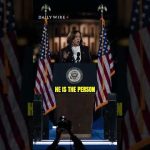Tim Walz has once again demonstrated the Democrats’ remarkable ability to shoot themselves in the foot while trying to vilify their opposition. The Minnesota governor didn’t just dip his toes into the murky waters of political rhetoric; he dove in headfirst, likening thousands of Trump supporters to Nazis. This not-so-subtle jab is emblematic of a party that ostensibly champions “unity” while incessantly peddling division. Instead of fostering dialogue, these Democrats prefer name-calling, leaving millions of everyday Americans to wonder what ever happened to civility.
When asked about his incendiary comparison, Walz clumsily attempted to clarify his stance, insisting that he was merely calling out the “hate” that he claimed emerged from a recent Trump rally in New York. One would think that anyone with an ounce of political savvy would recognize that calling their opponents Nazis is less about addressing hate and more about projecting their own vitriol onto those who disagree with them. If anyone is truly promoting hatred and division, it’s the very Democrats who keep upping the ante in their derogatory rhetoric.
IN CASE YOU MISSED IT:
Walz doubles down that calling Republicans "N*zis and Trash" is okay claims that it is a "unifying message."
We cannot allow someone with this mental capacity in the White House! pic.twitter.com/IhC9Tn9ilB
— Anthony Hughes (@CallMeAntwan) October 30, 2024
The media has quickly jumped on Walz’s comments, and rightly so. Reporters pressed him about the implications of Biden’s recent “garbage” remark aimed at Trump supporters and the inconsistency of claiming unity while demonizing anyone who supports the former president. Despite the clear undertones of aggression in Harris’s claims that Trump is a dictator, Walz, in a fit of partisanship, defended the rhetoric as fitting for a president. This normalization of toxic dialogue reflects a deeper malaise within the Democratic party—a troubling detachment from the realities facing everyday Americans.
Key questions posed by CBS’s Tony Dokoupil emphasized the chronic pattern of the left’s divisive language. The suggestion that vilifying an entire demographic undermines their claim for unity struck a nerve, though Walz dismissed it as inconsequential. His insistence that their rhetoric has no bearing on their message of solidarity can only be described as an astonishing disassociation from reality. The mantra from Democrats seems to be that as long as they preach unity, the countless derogatory labels they hurl are excused. This kind of doublethink is reminiscent of Orwell’s dystopia, where truth takes a back seat to narrative and political expediency.
The fallout from Walz’s clumsy remarks is a stark reminder that Democrats may be losing touch with the very constituents they claim to represent. Rather than engaging in constructive debate, Walz and his cohorts have opted for a strategy that relies on smearing their opponents. This tactic, steeped in hypocrisy, showcases a party losing ground in a discourse demanding respect and understanding. The American people deserve better than the tired theatrics of a party unwilling to confront its own divisive history. In the end, it’s clear that the so-called champions of unity are often the most guilty of spreading division, and that is a reality that many voters will undoubtedly consider as they head to the polls.




